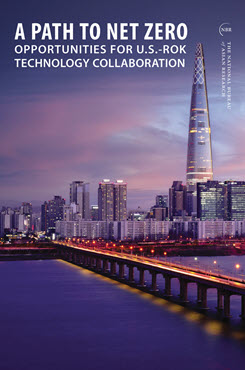NBR Special Report No. 101
A Path to Net Zero
Opportunities for U.S.-ROK Technology Collaboration
This NBR report explores how U.S.-ROK cooperation can position both countries to achieve their net-zero goals by 2050 and charts a future path for this long-standing partnership in a new era of climate action. The report focuses on the hydrogen economy, nuclear power, eco-friendly smart cities, and electric vehicles.
Foreword
As the wide-ranging effects of climate change on ecosystems, societies, and the global economy become increasingly clear, the need for international cooperation to address climate challenges is likewise growing. Whether through melting glaciers, harsher and longer wildfire seasons, or more severe storms, the impacts are global, and the response to the changing climate must be global as well. As two of the world’s most advanced economies, with a strong tradition of cooperation, the United States and the Republic of Korea (ROK) are working to lead the way on global efforts to address climate change and build energy systems to both mitigate and adapt to these changes.
The ROK has taken a prominent role, launching its “2050 Carbon Neutral Strategy” in December 2020. Despite a global pandemic, the plan commits to using “green innovations and advanced digital technologies” to achieve carbon neutrality by 2050.[1] Playing to the strengths of the South Korean economy, it emphasizes technological solutions such as improved carbon removal methods and synthetic fuels created from green hydrogen. With the election of President Yoon Suk-yeol in the spring, the country has also seen a resurgence in calls for nuclear energy to play a role in its plan for carbon neutrality.
In the United States, the Biden administration has made action on climate change a priority, rejoining the Paris Agreement within hours of taking office. At the Leaders’ Summit on Climate in April 2021, President Joe Biden set the goals of reducing greenhouse gas emissions by 50% across the U.S. economy by 2030 and achieving net-zero emissions by 2050.[2] Following the passage of the Inflation Reduction Act in August 2022, the United States will invest over $300 billion toward combating climate change through subsidies for renewable energy sources and electric vehicles (EVs), alongside research into groundbreaking technologies for hydrogen and nuclear energy.
The United States and ROK have a history of partnering on cutting-edge initiatives, from smart cities to safer nuclear power. In a joint statement, Presidents Biden and Yoon emphasized that bilateral cooperation on technologies like nuclear power, EVs, and the hydrogen economy would be vital for reaching their climate goals.[3] Both nations have also made efforts to promote environmental change beyond their borders and sought to align their respective regional strategies (the U.S. Indo-Pacific Strategy and the South Korean New Southern Policy) to better incorporate shared climate change and energy security goals in developing Asian economies. The speed of technological innovation and the urgency of action to address climate change have coalesced to make the coming decade critical to the future of the world’s climate resiliency.
Yet the ability to meet these shared goals will depend on developing policy and energy market capacities to keep pace with developments in technology and an increasingly urgent need for action. By exploring how U.S.-ROK cooperation can position both countries to achieve their goals, this National Bureau of Asian Research (NBR) report aims to chart a future path for this long-standing partnership in a new era of climate action. Funded by the Korea Foundation, it is part of a year-long program titled “U.S.-Korea Technology Cooperation for Climate Change Mitigation: The Path to Net-Zero.” This program examined areas where new technologies or better policies can lead to a cascade of reduced emissions, such as advances in EV batteries unlocking the potential to decarbonize the transportation sector or cutting-edge nuclear reactors providing baseload power and facilitating even greater renewable energy generation. By interviewing leading technology and policy experts from both the United States and South Korea, NBR identified four key subjects for research: the developing hydrogen economy, nuclear power, eco-friendly smart cities, and private sector hurdles in the EV battery market. NBR then commissioned four essays by scholars with expertise on these issues, who presented their preliminary findings at a hybrid roundtable discussion held online and in Seattle on June 14, 2022. Feedback from participants at the event informed the authors’ research into how the United States and ROK can better align their policies and cooperate on these critical issues.
In the report’s first essay, Kyungjin Boo of Seoul National University examines the nascent hydrogen economy and its role in a net-zero future. In his analysis, Boo highlights how the ROK and United States have complementary strengths. While South Korea has focused on fuel cells for cars, the United States’ advantage lies in hydrogen production. Because a chief advantage of hydrogen is its ability to serve as an energy carrier, the two countries should use this natural synergy to lay the groundwork for a global hydrogen economy by setting standards and establishing safety norms to facilitate both the supply and demand sides of the hydrogen future.
The second essay by James E. Platte of the School of Advanced Military Studies looks at the long history of and prospects for civil nuclear cooperation between the United States and ROK. Platte suggests that nuclear energy can help both countries reach net zero, but the coming decade is critical for establishing a sustainable place for nuclear energy beyond 2030. The election of President Yoon and Russia’s invasion of Ukraine mean that collaboration is both more likely and more necessary than in the past. Platte suggests that the time is ripe for cooperation on developing advanced small modular reactors, alongside collaborative efforts on securing new sources of low-enriched uranium and decommissioning older reactors.
The third essay, written by Sang Keon Lee of the Korea Research Institute for Human Settlements, considers the emerging concept of the eco-smart city, and advocates for leveraging technology and the “big data” revolution to simultaneously achieve a carbon-neutral urbanized future. Lee makes the case that easy access to data, artificial intelligence, and public-private partnerships can help promote net-zero goals in decision-making by both the government and citizens. For the United States and South Korea, collaboration on best practices for creating eco-smart cities would not only benefit their own populations but also help provide solutions for developing countries undergoing rapid urbanization.
The final essay by June Park of Princeton University explores the intensely competitive private sector landscape in renewable energy technology by examining a major trade and intellectual property dispute between LG Energy Solutions and SK Innovation, two key players in EV battery technology. Park argues that the limits of bilateral cooperation will be tested as the market for EVs grows because U.S. and ROK private sector interests will not always align with government policy directions. She asserts that policymakers must focus on setting standards for safety and preparing a legal structure to handle future disputes to avoid a possible roadblock to net-zero transportation.
These essays cover technologies at various stages of development. Some, such as nuclear power, stem from decades of collaboration; others, such as EV batteries, are experiencing huge growth (and growing pains); and some, such as hydrogen and smart cities, lie at the cutting edge of new energy systems. Yet the clear policy priorities of involving private sector and citizen stakeholders and acting quickly in a decisive decade are emphasized throughout the report. For either the United States or the ROK to reach a net-zero society by 2050, the technology to facilitate this change must be established in the next ten years. While care must be taken to ensure that collaboration is fruitful on both sides, the prospects for cooperation on achieving these climate goals are great. Moreover, U.S.-ROK cooperation could confer benefits beyond the two nations as these key technologies become more mature and regularly deployed.
This NBR Special Report was made possible by the generous support of the Korea Foundation, whose efforts to advance bilateral relations have greatly improved the policy and cultural exchanges between the United States and the ROK. NBR hopes that this report will continue the long tradition of enhancing discourse between the two nations. Additionally, over the past twelve months, we have interviewed and spoken with numerous U.S. and Korean scholars, technology experts, and policy leaders on the prospects for cooperation in clean energy technology. There are too many people to list individually, but the roundtable and this report would not have been possible without their contributions.
Finally, this report could not have been produced without the work and support of NBR’s staff, especially Ashley Johnson, Audrey Mossberger, Chihiro Aita, Micah Sindelar, and Arsalan Ahmed. From their leadership in coordinating a hybrid event amid another Covid-19 surge in the spring to their help with researching authors and key topics for the project, this is the culmination of a year of work from them and numerous others. I hope that you find the report as informative, insightful, and enjoyable to read as it has been to work on.
Thomas Lutken
Project Manager, Energy and Environmental Affairs, NBR
Endnotes
[1] Government of the Republic of Korea, “2050 Carbon Neutral Strategy of the Republic of Korea: Towards a Sustainable and Green Society,” December 2020, https://unfccc.int/sites/default/files/resource/LTS1_RKorea.pdf.
[2] “President Biden’s Leaders Summit on Climate,” White House, Fact Sheet, April 23, 2021, https://www.whitehouse.gov/briefing-room/statements-releases/2021/04/23/fact-sheet-president-bidens-leaders-summit-on-climate.
[3] “United States–Republic of Korea Leaders’ Joint Statement,” White House, Press Release, May 21, 2022, https://www.whitehouse.gov/briefing-room/statements-releases/2022/05/21/united-states-republic-of-korea-leaders-joint-statement.



